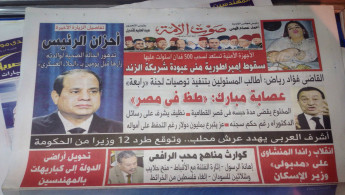Rights groups condemn rise of newspaper censorship in Egypt
Press freedom NGOs have slammed the recent wave of newspaper censorship in Egypt, after authorities have prevented three privately owned newspapers from going to print or circulation for content critical of the government.
The Committee to Protect Journalist [CPJ] released a statement on Tuesday that slammed the Egyptian government’s heavy handed approach to censorship and called on authorities allow for more press freedom.
“In addition to intimidating journalists with legal harassment and jail, Egypt is resorting to crude censorship to ensure that critical coverage does not see the light of day,” said Sherif Mansour, the CPJ’s Middle East and North Africa Programme Coordinator.
|
Egypt is resorting to crude censorship to ensure that critical coverage does not see the light of day - Sherif Mansour |
“We call on authorities to stop interfering with newspapers and instead allow the public to exercise its right to news and information,” he added.
The Arabic Network for Human Rights Information [ANHRI] also condemned the suspension of the newspapers’ print, saying, the Egyptian press has deteriorated because of the authorities’ “hostility” towards press freedom.
On Saturday, the newspaper al-Misriyoun was pulled from print over a story critical of Sisi’s use of religious rhetoric in his speeches and a report on rumours the delays to the President’s state visit to the UK are possibly related to threats to prosecute him.
Authorities also kept the weekly al-Sabah out of print over an article headlined “How to become the President’s kid in nine steps” - a critical response to an interview with a pro-government politician.
Earlier this month, police removed printed copies of the tabloid Sout al-Umma from news-stands and ripped them to shreds over stories critical of Egypt’s former president Hosni Mubarak, whose leadership was toppled in 2011 following mass protests.
Sout al-Umma’s headlines that led to newspapers being destroyed include, “Mubarak’s gang says screw Egypt”, “Mubarak spends his prison sentence in palace” and “Sisi’s mother’s health has deteriorated”.
The newspaper establishment in Egypt also been in an uproar, “The recent closure of some newspapers is a dangerous phenomenon that is taking Egypt back 200 years in the past,” Secretary General of the Egyptian Press Syndicate Gamal Abd al-Rahim told al-Mal.
“The dangers currently facing newspapers are worse than when the Muslim Brotherhood and Mubarak were in power. There is a systematic, illegal and unconstitutional campaign against freedom of speech going on [in Egypt],” he added.
The wave of censorship comes as the government has approved an anti-terrorism law that criminalises reporting anything but the official line on militant attacks.
The 54-article bill also defines terrorist crimes in a broad manner that can be used to threaten and imprison critical journalists.
In June, the CPJ released a report that said Egypt is holding the highest number of journalists behind bars since record keeping began in 1990, most of which have been accused of affiliation with ousted Islamist leader Mohamed Morsi.
According to CPJ research, 22 journalists are currently behind bars in Egypt because of their work, despite government claims that no journalists have been detained for “doing their jobs”.
Last week, news photojournalist Ahmed Ramadan was arrested after a former colleague alleged he was a member of the banned Muslim Brotherhood.





 Follow the Middle East's top stories in English at The New Arab on Google News
Follow the Middle East's top stories in English at The New Arab on Google News


